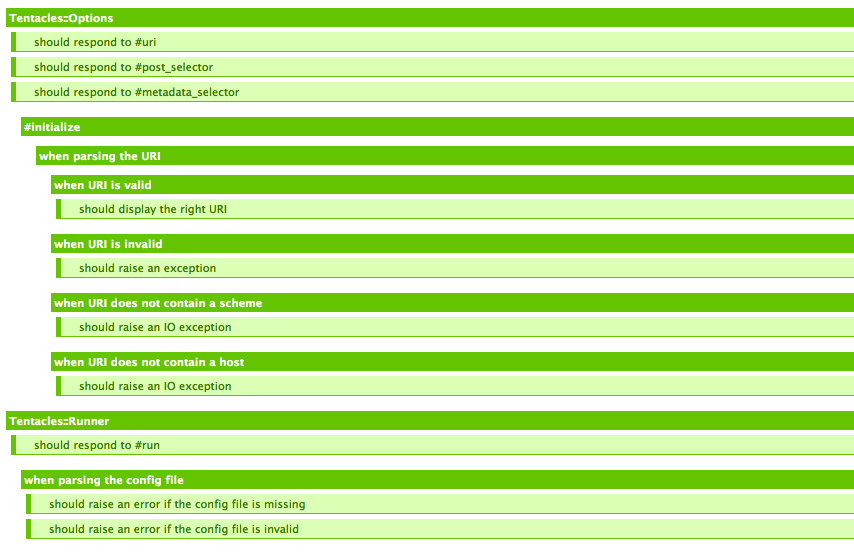Object Oriented Scraper Backed With Tests Pt. 3
I did some cleanup this morning on the Options class and the options_spec, mainly to remove items that seemed like they shouldn’t be tested. Here’s where I’m currently at:
require 'yaml'
module Tentacles
class Options
attr_reader :uri
attr_reader :post_selector
attr_reader :metadata_selector
def initialize(config)
@config = YAML.load(File.open(config))
@config.each do |key, value|
raise IOError, "#{key} is undefined!" if key.nil?
end
@uri = URI.parse(@config["uri"])
raise IOError, 'Invalid uri!' if @uri.scheme.nil? || @uri.host.nil?
@post_selector = @config["post_selector"]
@metadata_selector = @config["metadata_selector"]
end
end
end
require_relative '../lib/tentacles/options'
require 'yaml'
require 'uri'
require 'helpers'
describe Tentacles::Options do
include Helpers
before do
@options = Tentacles::Options.new(relative_path + '/../lib/tentacles/config.yml')
end
subject { @options }
it { should respond_to(:uri) }
it { should respond_to(:post_selector) }
it { should respond_to(:metadata_selector) }
describe "#initialize" do
describe "when parsing the URI" do
context "when URI is valid" do
it "should display the right URI" do
uri = URI.parse('http://robdodson.me')
@options.uri.should eq(uri)
end
end
context "when URI is invalid" do
it "should raise an exception" do
expect { options = Tentacles::Options.new(relative_path + '/mocks/invalid_uri.yml') }.to raise_error(URI::InvalidURIError)
end
end
context "when URI does not contain a scheme" do
it "should raise an IO exception" do
expect { options = Tentacles::Options.new(relative_path + '/mocks/no_scheme_or_host_uri.yml') }.to raise_error(IOError)
end
end
context "when URI does not contain a host" do
it "should raise an IO exception" do
expect { options = Tentacles::Options.new(relative_path + '/mocks/no_scheme_or_host_uri.yml') }.to raise_error(IOError)
end
end
end
end
end
Previously I was testing against @config = YAML.load(File.open(config)) to see if it would throw an error when passed nil or empty string for the argument. I’ve since realized that’s basically testing Ruby Core to see if it’s working as described in the docs…which seems silly to me. Now if I were handling those exceptions and doing something in response, then yeah, I would want to test it. But since I’m allowing the program to explode if you try to load an empty config file I figure it’s best to just let the core or stdlib do their thing and assume that it was well tested. Having said that I think we’ve got decent coverage on Options and can move back to the Runner and then the Crawler.
By the way, if you want a more visual representation of our tests you can run bundle exec rspec -f html -o index.html which will generate an html file showing what passed/failed and is still pending.

Mocking Nokogiri requests with FakeWeb
I was curious if it would be possible to mock the Nokogiri requests from our Crawler so I did a bit of googling. It looks like the best options would be either Artifice or FakeWeb. I’m not super familiar with Rack and I don’t want to write a separate app just to mock a few calls so I’ve decided to go with FakeWeb.
First we add it to our Gemfile
source 'https://rubygems.org'
gem 'rspec', '2.9.0'
gem 'nokogiri', '~>1.5.2'
gem 'awesome_print', '~>1.0.2'
gem 'fakeweb', '~>1.3.0'
and do the usual bundle install. Next we’ll stub out our crawler_spec and verify that it’s at least detecting all the methods on the class.
require_relative '../lib/tentacles/crawler'
describe Tentacles::Crawler do
before do
# A mock for our options object
options = {
uri: 'http://robdodson.me',
post_selector: '.entry-content',
metadata_selector: '.personal-metadata'
}
@crawler = Tentacles::Crawler.from_uri(options[:uri])
end
subject { @crawler }
it { should respond_to(:get_words_by_selector) }
it { should respond_to(:get_metadata_by_selector) }
end
I also want to verify that my class responds to an alternative constructor. Rather than just saying Crawler.new I’d prefer to use Crawler.from_uri. It doesn’t serve much of a purpose but I think it’s a good exercise. Here’s the modified test to support it.
require_relative '../lib/tentacles/crawler'
describe Tentacles::Crawler do
describe "constructors" do
describe "#from_uri" do
it "should respond" do
Tentacles::Crawler.should respond_to(:from_uri)
end
it "should return an instance" do
crawler = Tentacles::Crawler.from_uri('http://robdodson.me')
crawler.should be_an_instance_of(Tentacles::Crawler)
end
end
end
before do
options = {
uri: 'http://robdodson.me',
post_selector: '.entry-content',
metadata_selector: '.personal-metadata'
}
@crawler = Tentacles::Crawler.from_uri(options[:uri])
end
subject { @crawler }
it { should respond_to(:get_words_by_selector) }
it { should respond_to(:get_metadata_by_selector) }
end
And here is our Crawler class based largely on our original Crawler from the first post.
require 'open-uri'
require 'nokogiri'
module Tentacles
class Crawler
def self.from_uri(uri)
new(uri)
end
def initialize(uri)
@uri = uri
@doc = Nokogiri::HTML(open(@uri))
@counts = Hash.new(0)
end
def get_words_by_selector(selector)
entries = doc.css('div.entry-content')
puts "Parsing #{entries.length} entries"
entries.each do |entry|
words = words_from_string(entry.content)
count_frequency(words)
end
sorted = @counts.sort_by { |word, count| count }
puts sorted.map { |word, count| "#{word}: #{count}"}
end
def get_metadata_by_selector(selector)
# TODO
end
private
def words_from_string(string)
string.downcase.scan(/[\w']+/)
end
def count_frequency(word_list)
for word in word_list
@counts[word] += 1
end
@counts
end
end
end
If we run the specs now they should pass but they’re EXTREMELY slow! Just 4 examples takes 6 seconds O_O. Can you spot the source of all that lag? Take a look at what happens inside of Crawler#initialize. Notice how it’s creating a new Nokogiri doc every time? Since we have a before block in our spec that means that each test (after the before) is going out and parsing our website. Let’s see if FakeWeb can help us out some.
require_relative '../lib/tentacles/crawler'
require 'fakeweb'
describe Tentacles::Crawler do
before do
# Create a mock options object
@options = {
uri: 'http://robdodson.me',
post_selector: '.entry-content',
metadata_selector: '.personal-metadata'
}
# Create a mock web request
FakeWeb.register_uri(:get, @options[:uri], :body => "Hello World! Hello San Francisco!")
end
describe "constructors" do
describe "#from_uri" do
it "should respond" do
Tentacles::Crawler.should respond_to(:from_uri)
end
it "should return an instance" do
crawler = Tentacles::Crawler.from_uri(@options[:uri])
crawler.should be_an_instance_of(Tentacles::Crawler)
end
end
end
describe "instances" do
before do
@crawler = Tentacles::Crawler.from_uri(@options[:uri])
end
subject { @crawler }
it { should respond_to(:get_words_by_selector) }
it { should respond_to(:get_metadata_by_selector) }
end
end
While it’s not the prettiest test ever written it does get the job done. 0.00359 seconds for 4 examples down from 6 seconds! That’s going to wrap it up for tonight. Tomorrow we’ll finish off the spec and the implementation and finally get some data coming down from the live site. Until then!
You should follow me on Twitter here.